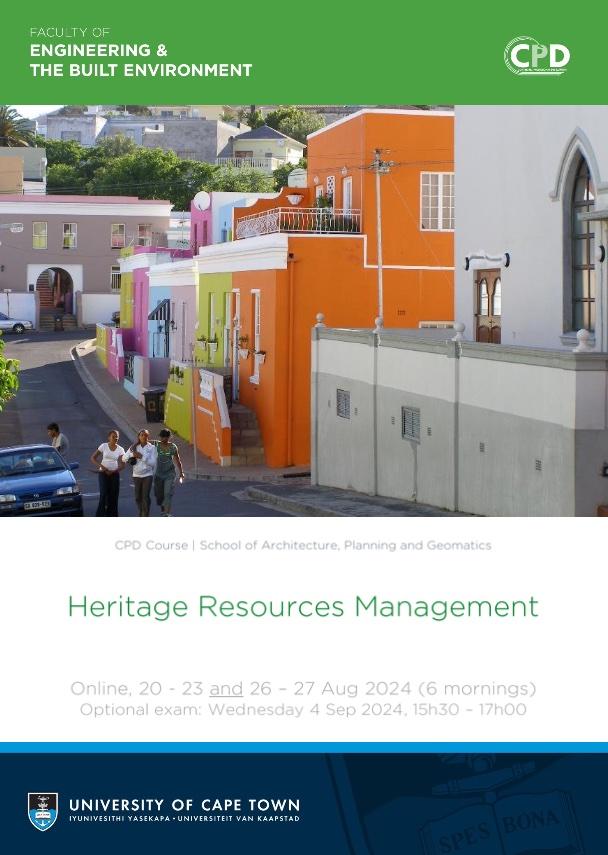This three-day course (presented online over 6 mornings) is aimed at guiding professionals and lay people who need to engage with the heritage and local planning authorities; and it is designed to introduce course participants to the history and theory of architectural and urban conservation and to uncover the operation of those ideas in current conservation practice in South Africa. The course aims to introduce and develop the participants’ knowledge of the principles and methods of sound conservation practice. On completion of the course participants will be able to:
- Understand the ideas underpinning architectural and urban conservation
- Understand the relationship between these ideas and principles of practice that have developed (as expressed in national and international charters)
- Recognise the expression of these ideas and principles in the South African legislation
- Understand the relationship between ideas about architectural and urban conservation and the processes of identifying heritage resources and assessing their significance
- Recognise the adoption of these ideas and principles in practice
Course content
The contents of the course will include:
- an introduction to the history of the ideas and theories of architectural and urban conservation
- a brief introduction to certain national and international charters
- a grounding in the principles of conservation practice
- an introduction to the South African legislation and the current administrative practices
- an introduction to the research techniques and sources used in this multi-disciplinary practice
Who should attend
The course will benefit all who are involved in conservation practice and heritage management and others involved or interested in the regulation of development. This includes architects, planners, heritage practitioners of all disciplines (archaeologists, historians, etc), heritage managers or administrators and NGO-activists. The course is widely applicable and designed to satisfy the multi- disciplinary nature of conservation practice and heritage resource management.
Course presenter
The course presenter and principal lecturer, Dr Stephen Townsend, graduated in architecture in Cape Town, completed a diploma in conservation studies at the University of Rome (equivalent to a master’s degree) and a PhD at UCT. He has worked as an architect, as an administrator of land use- and of conservation-related regulations at the Cape Town City Council, and as the CEO of Heritage Western Cape; and he was appointed to the Heritage Western Cape Council in 2010 for a three-year term and chaired its Impact Assessment Committee and served on its Built Environment and Landscape Committee (BEL Comm) and its Inventories and Grading Committee. He set up and convened the M Phil in Conservation of the Built Environment programme at UCT’s School of Architecture and Planning for nine years; and now consults.
The lectures/seminars will be presented by specialists in the field (see the attached programme); all of them have worked for or have served on the permit committees of the provincial heritage resources authority, Heritage Western Cape or other authorities administering the controls operating in the Western Cape.
Overview
- Name: Heritage Resources Management
- Duration: 20 - 23 and 26 – 27 August 2024; 09h00 – 13h00 (6 half-days)
- Venue: Online via MS Teams
- Optional Exam: 4 September 2024; 15h30 – 17h00
- CPD Accredited with ECSA and CIfA for CPD points
- Participants: Architects, planners, heritage practitioners, archaeologists, historians et
- Fees Standard delegate: R9 450
- Contact details: For more information or details on CPD courses, visit our website (click here to view) or e-mail: ebe-cpd@uct.ac.za
Disclaimer: Any views expressed by individuals and organisations are their own and do not in any way represent the views of The Heritage Portal.

